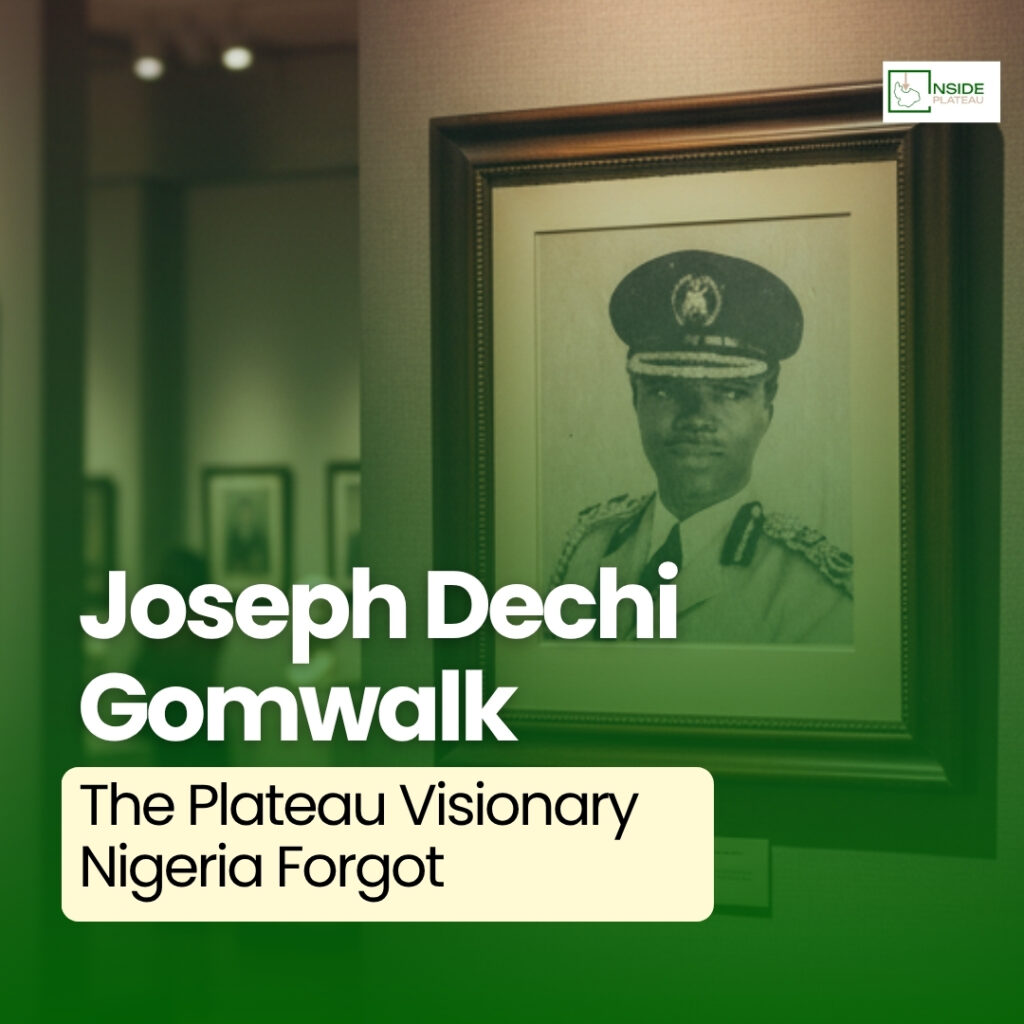At a time when uniformed men were feared, Plateau had one worth remembering. Maybe because he wore his ideas louder than his khaki, and his shadow did not fill up rooms and silence tongues. On the contrary, this man spent his days sketching classrooms and visionary ideas, as well as purchasing printing presses. So, while headlines across Africa measured coups in tanks and curfews, this governor measured success in matriculation lists and editorial columns.
Think about that for a beat: a man in uniform who bet his authority on classrooms, not checkpoints. Who chose campus over camp, ink over orders, scholarships over show-of-force. He planted a university where outsiders said it couldn’t thrive. He launched a newspaper when many rulers used the press as a broom to sweep inconvenient voices away. He hired teachers before he hired aides. That’s the kind of contrarian energy that makes you stop and ask, “Who actually is this?” His name was Joseph Dechi Gomwalk, and this is his story.
From Ampang to Authority
Long before “His Excellency” became his title, Joseph Dechi Gomwalk was simply a bright boy from Ampang, a quiet, highland village in today’s Kanke Local Government Area in what we now call Plateau State. Born on April 13th, 1935, J.D as he is now lovingly called did not grow up around power but around purpose; and like most Plateau legends, his story took its first remarkable turn in a place that has produced more change-makers than monuments—Boys’ Secondary School, Gindiri.
Gindiri housed more than just a school; it birthed a graceful reality: an experiment in discipline, faith, and intellect that turned village boys into visionaries. The corridors of that school have seen the making of preachers, professors, poets, and public servants who later carried Plateau’s name into every corner of Nigeria. There, young Gomwalk learned what true leadership looked like (not the loud kind that commands, but the steady kind that builds).
They say Gindiri trained the mind to think and the heart to serve and Gomwalk did both brilliantly. He excelled in his studies, stood out for his precision, sportsmanship, and a quiet conviction that knowledge was the highest form of strength. Those who knew him then say he had the calm of a scholar and the posture of someone already planning something far bigger than himself.
The Makings of a Visionary
When he left Gindiri for the University of Ibadan, he carried more than certificates; he carried a mindset. Hence, studying zoology in Ibadan, he began to see governance like an ecosystem: balance the environment, nurture the species, and the whole thrives. That scientific clarity, that Gindiri discipline, and that Plateau humility together, made the man who would later turn a fledgling state into a classroom of progress.
So if Plateau today prides itself on education, intellect, and service, it’s because men like JD Gomwalk once walked out of Gindiri with chalk dust on their sleeves and the future in their notebooks.
Vision Carved in Stone and Service
When Joseph Dechi Gomwalk assumed office as the first military governor of newly culled Benue-Plateau State in 1967, he inherited little more than the hopes of a newly divided federation and a handful of administrative buildings. However, in just eight years (up until his tragic death in 1975) he reimagined what governance could look like in a young Nigeria.
His administration was marked not merely by the projects it launched, but by the principles that powered them. These principles consisted of education, empowerment, and enterprise.
To this degree, the University of Ibadan’s Jos campus (1971), which became the University of Jos in 1975, and the establishment of the Nigeria Standard newspaper in 1972, are perhaps the most visible monuments of his vision. One fed the mind, the other the voice of the people, all proof that for Gomwalk, enlightenment came before applause. A humble assertion of the saying that empty vessels may produce noise, but a vessel filled with substance makes music.
A System that Gave Power to the People
Under Gomwalk’s watch, the Plateau became a construction site of ideas such as the Jos-Bukuru water project, the Benue-Plateau Investment and Properties Company (now known as the Plateau Investment and Property Development Company, PIPC), the Jos Main Market (also know as the Terminus Indoor Market), several Government Colleges, the Plateau Hotel, and staff quarters for civil servants, among a host of other ambitions. All these bore testament to a man who governed like a craftsman, building not just structures but systems.
Beyond institutions, however, Gomwalk built people as well. Between 1970 and 1973, history has it that his empowerment programme reportedly supported over 3,000 entrepreneurs, farmers, and traders across the old Benue-Plateau, creating a new generation of indigenous business leaders. Many of whom have gone on to anchor the region’s economy long after his time. His leadership was ‘people-first’ long before the phrase became a cliché; a belief that governance should not only build roads but also open doors.
Consequently, even as political tensions of the Benue-Plateau era simmered, amplified by the complexities of ethnicity, geography, and post-civil-war politics, Gomwalk’s administrative compass remained steady. He saw education as the equalizer, industry as the great unifier, and public service as sacred trust. Like the city of Jos itself which stood (and still stands) at the crossroads of faith, ethnicity, and geography, his governance tried to harmonize many voices into one song of progress.
The Silencing of a Man, the Echo of a Legacy
Sadly, history, in its quiet cruelty, often spares no room for the kindhearted dreamer. For Joseph Dechi Gomwalk, that truth came too soon.
In February 1976, Nigeria’s fragile unity trembled once more as Lieutenant Colonel Bukar Suka Dimka led a failed coup. In the storm that followed, Gomwalk’s name appeared among the accused, not for proven guilt, but for perceived association. Many of his peers (civil servants, soldiers, and citizens alike) would later insist he was innocent; he was, they said, a victim of the times. However, as an old African saying goes, it is too late to cry when the head is already off (or in this case, shot into oblivion).
On May 15, 1976, at just 41 years old, Joseph Dechi Gomwalk was executed by firing squad. And in that singular act, a dreamer was silenced, albeit but never defeated.
He did not live to see the final stones laid on some of his most ambitious projects. Like the University of Jos, which he fought so hard to establish, rise to full autonomy later that same year. Or the Nigeria Standard Newspaper, which he founded in 1972, become one of Northern Nigeria’s most respected voices in journalism. He did not witness the completion of the Jos Ultra-Modern Market which he envisioned to be the largest in sub-Saharan Africa. Nor the Jos International Breweries blossom into an industrial landmark or the stadium project along Zaria Road that would later symbolise Plateau’s sporting pride. No, he did not see the economic seeds he planted in over 3,000 small and medium businesses empowered under his administration mature into the foundations of Plateau’s indigenous enterprise.
And yet, his vision endured. Every brick, every book, every byline that carries the Plateau name bears traces of his blueprint. His legacy was not left in monuments alone, but in momentum; in the idea that leadership must be defined by service, not survival. Decades after his death, the Joseph Gomwalk Secretariat still hums with government activity; the University of Jos continues to educate thousands from every corner of Nigeria; and the Standard Building, still standing proud in West of Mines, remains a testament to his belief that Plateau must always have a voice.
True to the words he once spoke, “We cannot talk of progress if the people’s hands are empty.” It is why he built roads to connect them, schools to educate them, and systems to empower them. He filled a young state’s empty hands with possibility.
The Plateau Remembers the Legend Who Never Left
Evidently, time has a way of fading names from the nation’s memory, but, not from the Plateau. Here, among the hills and red earth that once echoed his footsteps, Joseph Dechi Gomwalk is not a forgotten governor. He is a legend and he is family.
One quiet afternoon in Jos, a curious child stood before the towering JD Gomwalk Building in West of Mines. As the bronze plaque gleamed under the sun, he tugged at his mother’s hand and asked, “Mama, who is Gomwalk?”
For a moment, she said nothing. Then a man nearby (an elderly vendor selling newspapers at the corner) smiled and joined in. He folded his arms and began to tell the story the way Plateau people do: not as a history lesson, but as a hymn.
He told the boy about the policeman who became a governor; about the dreamer who built schools before he built roads; about how he birthed the University of Jos in 1971 and gave Plateau a newspaper of its own in 1972; all because he believed that every land with a voice must first have the mind to think. He spoke of a man who empowered over 3,000 men and women, not with slogans but with substance. And then, with a sigh that carried decades of memory, he said, “He died too soon… but everything good you see in Plateau started from his dream.”
The child nodded slowly, his gaze climbing up the building again; and in that moment, one more generation had learned the name. That is how the Plateau remembers him. Not through textbooks, but through testimonies. Not through statues, but through stories.
Online, the love still flows across timelines and comment sections:
“Immortalize him by renaming the University of Jos after him. He was instrumental to its establishment,” one wrote.
“They conspired to kill an innocent visionary leader,” another cried.
“The only police officer as administrator among military administrators. A handsome officer. RIP!” echoed yet another.
With each passing day, the Plateau mourns their fallen hero with prayers and shared memories of what his short time in office meant to the state as a whole. Each one a digital candle, flickering in collective remembrance.
And then there was Senator Venmak Dangin, one of Gomwalk’s early contemporaries, who captured what many feel but few can phrase: “He was the Mandela of Plateau State—composed, well-educated, and self-sacrificing.”
The Candle Burns on
From the markets of Pankshin to the streets of Bukuru, from the classrooms of Gindiri to the boardrooms of Jos, that feeling endures. For the Plateau people, JD Gomwalk is not a man who once ruled. He was a vision that still rules hearts.
Every time the sun falls behind Shere Hills and lights up the Standard Building in gold, Plateau State remembers. Every time the University of Jos matriculates a new set of students, the people salute. Every time a leader dares to dream of a better tomorrow, his vision is reborn and alive once more.
He may not have a statue in Abuja or a chapter in every Nigerian textbook,
but here, where the cold air meets the mountains, JD Gomwalk remains immortal; not because of power or politics, but because of purpose. Because he built Plateau not just with brick and mortar, but with belief: a belief that a small state in the heart of Nigeria could stand tall and call itself the conscience of the nation.
And that, perhaps, is why we tell his story still. Because some men govern, but only a few, like Gomwalk, leave behind a gospel.

